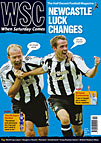 Video referees would hand even more control of the game to Sky
Video referees would hand even more control of the game to Sky
You’ll have seen or heard the exact same interview several times, unless you have become more adept than we are with the remote control. A scowling manager appears to be making a big effort to control his emotions while he is asked about the controversial decision that has “cost” his team a win, a suspension, or the chance to come back from 3-0 down. It happens, understandably, when people are upset. But the manager will then be invited to agree that we must consider using technology to help referees get offside/handball/goalline decisions right.
Many will jump at the chance (though not that nice Stuart Pearce) for all sorts of reasons. Anything to distract attention from a poor performance, which your supporters have paid through the nose to watch, for a start. Despite the relative tail-off in sackings this season, it is still true that many clubs give their man very little time to succeed. This leads, of course, to more desperate tactics, a worse quality of play and even more need to distract attention from the performance. And they certainly believe putting pressure on referees works (by leading to more mistakes, but perhaps in your favour).
To state the obvious, the world would be a better place if officials made fewer errors. For example, the extraordinary Boxing Day coincidence of missed handballs led to some poor attempts at jokes on Match of the Day, even by Gary Lineker’s standards. By and large, the BBC’s pundits just wiggle their eyebrows, though. There have been aspersions cast at MOTD for its perceived reluctance to delve into controversies involving, say, Alan Shearer, but the Something Must Be Done demands are really the natural province of the live broadcaster and Sky pitch into the debate with gusto. Because if television footage is ever used to settle close calls, then you can bet your £50 special offer Premiership Plus subscription that it will be Sky’s cameras that will be supplying the evidence. Nor will they hesitate to remind you of this fact.
Sky have long and relentlessly stressed the incredible importance of what they are screening, back to the “whole new ball game” slogan with which they launched the Premiership in 1992. Much of this importance is self-importance, of course, and the use of their cameras to determine the outcome of matches would make them very even more unbearable. Already Mr Justice Kamara holds court each Sunday, demanding that officials reverse bookings and dismissals that have caught his eye. That is nothing compared to the bid for power Sky are making when it comes to “helping” refs by use of monitors or an extra official in the stands.
You could only have video referees when there were cameras and enough of them, of course. At present, the laws are the same from top to bottom, with everyone trying to enforce them to the best of their ability, but in future an awkward split-second call in a mid-table Premiership match at Ewood Park could be handled differently than a similar situation at Edgeley Park that could determine if a side stay in the Football League. What round, meanwhile, would the cameras be introduced at in the FA Cup? Surely the FA Cup third-round ties shown live would not be treated differently to the 28 or so other games at that stage?
Of course, if every game did have video referees then the footage would have to be clear, consistent and with every incident available for replay from multiple angles – it’s not like cricket where you have two fixed targets or a bit of isolated action involving a ball, a man and a rope. People would soon be looking at their programmes before kick-off and moaning: “Not that bloody cameraman again.”
Using replays to make decisions during play would break the link from grass-roots football to the highest level and a fundamental aspect of the game would be lost should that ever happen – a football match should be subject to the same rules wherever it’s played. That’s not good enough for Sky, who already determine just when matches are played.
There was plenty of discussion about how unfair it was, late postponement or not, to ask Charlton fans to go to Newcastle on a midweek night over Christmas. This season, Sky’s demands have, among others, left Arsenal fans needing to get back from Middlesbrough and Newcastle, Portsmouth fans from Bolton and West Ham fans from Sunderland, all after matches finishing at around 7.15pm on a Saturday. UEFA Cup obligations have played a part, but Middlesbrough’s first three o’clock Saturday kick-off of 2005-06 was on New Year’s Eve.
Sky have bought the rights to broadcast certain games and competitions for a limited period; they do not own football itself. If the game’s authorities want to do something about the controversy surrounding refereeing decisions, they could start by returning to an interpretation of offside that bears some relation to the wording of the law itself. And perhaps liven up those backdrops used for interviews these days with lists of all the debatable decisions that have gone that team’s way of late.
From WSC 228 February 2006. What was happening this month